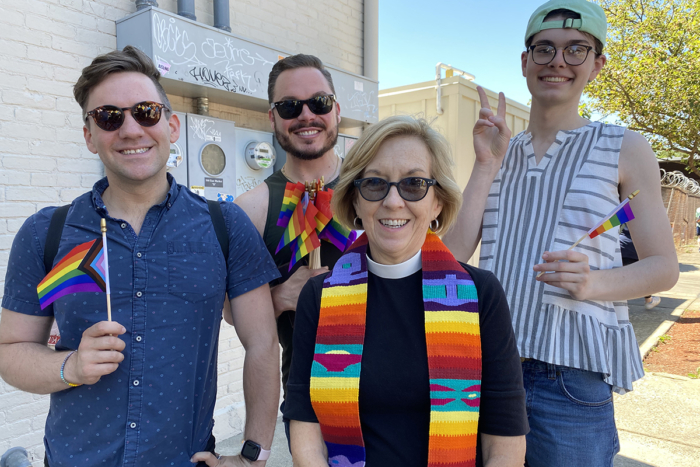Kentucky church affirms LGBTQ+ inclusiveness against legislation targeting transgender care, drag showsPosted Mar 27, 2023 |
|

Representing Calvary Episcopal Church, from left, Jacob Middleton, Derek Inghram, the Rev. Lee Shafer and Amy Gillig gather to participate in the June 2022 Pride Parade in Louisville, Kentucky. Photo courtesy of Lee Shafer
[Episcopal News Service] Republican lawmakers in state legislatures across the United States have proposed hundreds of anti-LGBTQ+ bills in recent years as they embrace culture war policies that are increasingly focused on limiting transgender rights and acceptance in schools, health care and other public spheres.
Among the laws passed so far this year are Tennessee’s prohibition on gender-affirming care for trans children and a separate state measure that outlaws drag shows on public property or in private venues accessible by children. Utah enacted its own law this year restricting the medical care available to children experiencing gender dysphoria, and in Arkansas, a new law has banned transgender students from using school restrooms that match their gender identity.
In Kentucky, where the American Civil Liberties Union has tracked at least 10 such bills introduced in this legislative session, members of Calvary Episcopal Church in downtown Louisville are engaging with these issues while seeking ways of conveying a greater sense of welcome to LGBTQ+ residents and their supporters.
“Louisville is a very progressive town” compared to the rest of Kentucky, the Rev. Lee Shafer, Calvary’s rector, told Episcopal News Service. She and some members of the congregation recently attended a town hall-style event called “Drag Is Not a Crime” that rallied opposition to one of the Kentucky bills, similar to the one passed in Tennessee, that would restrict performances “involving male or female impersonators.”
Derek Inghram, a member of Calvary who is gay, attended the “Drag Is Not a Crime” event. “The way [the bill is] written is that it would not only hurt people in drag … but also anyone appearing in clothing opposite of their assigned sex at birth,” Inghram said.
Shafer also wrote an opinion article published March 14 by the Louisville Courier-Journal defending drag shows and sharing the story of how she and her family arranged for drag queens at a local restaurant to serenade Shafer’s husband on his 90th birthday in 2021.
“We are called to love people where they are and who they are. I think that’s the bottom line,” Shafer told ENS. “If we’re called to love people, then any decision we make should look like a loving act.”
The bill pertaining to drag shows was passed by the state Senate but stalled in the House and appears dead this year, according to local reports.
On March 15, Republican lawmakers succeeded in advancing another Kentucky bill containing a range of anti-trans measures. It would restrict gender-affirming care for children, allow educators to ignore trans students’ preferred pronouns and prohibit schools from teaching about sexual orientation or gender identity. The bill was sent to Gov. Andy Beshear, a Democrat, who vetoed it on March 24, setting up a likely override vote by the Legislature.
A year ago, the Legislature overrode Beshear’s previous veto of a Kentucky law that blocks transgender women and girls from competing on school sports teams that match their gender identity.
The Kentucky branch of the American Civil Liberties Union issued a statement saying the newly passed bill was “among the most extreme anti-trans attacks in the United States.”
“Legislators cannot erase transgender people from existence, and we will continue to fight for equal rights and equal protection under the law,” Amber Duke, the ACLU branch’s interim executive director, said in the written statement. “This dangerous bill and others like it across the country are nothing more than a desperate attempt to score political points by targeting people who simply want to live their lives.”
About 150,000 individuals ages 13 to 17 identify as transgender in the United States, according to a brief prepared by the American Medical Association. Many of them suffer from gender dysphoria, defined by the American Psychiatric Association as a “conflict between a person’s physical or assigned gender and the gender with which he/she/they identify.”
“Every major medical association in the United States recognizes the medical necessity of transition-related care for improving the physical and mental health of transgender people and has called for health insurance coverage for treatment of gender dysphoria,” the AMA has said.
The Episcopal Church’s 79th General Convention passed resolutions in 2018 that called on dioceses to remove barriers to full inclusion of nonbinary and transgender people in the church and to advocate for legislation that protects against discrimination.
Like many Episcopal churches, Calvary in Louisville has long identified itself as inclusive by promoting that “all are welcome,” a sentiment printed prominently in the congregation’s weekly service bulletin. As lawmakers were proposing anti-LGBTQ+ legislation in the state, Inghram asked Shafer if the church could expand its language to leave no doubt that “all” means all.
The bulletins now list “people of color, LGBTQIA+, drag queens, partnered and single, differently abled, families and children, young and old, our homeless neighbors, the alcoholic and addicted, believers and those questioning faith, anyone who desires a spiritual home.”
“Calvary’s welcome extends to all. But more importantly – God welcomes you for exactly who you are.”
Shafer, 61, has served at Calvary about four years. She previously worked in the 1990s as a case manager for a social service agency that assisted HIV and AIDS patients, an experience she described in her Courier-Journal opinion piece.
She told ENS she sometimes would bring her young children with her while paying visits to clients, including drag queens. She doesn’t understand why today’s politicians see them as threat. “These were people, people I worked with and spent time with, people I loved,” she said. “They were no different than the people I went to church with.”
– David Paulsen is a senior reporter and editor for Episcopal News Service. He can be reached at dpaulsen@episcopalchurch.org.

Social Menu